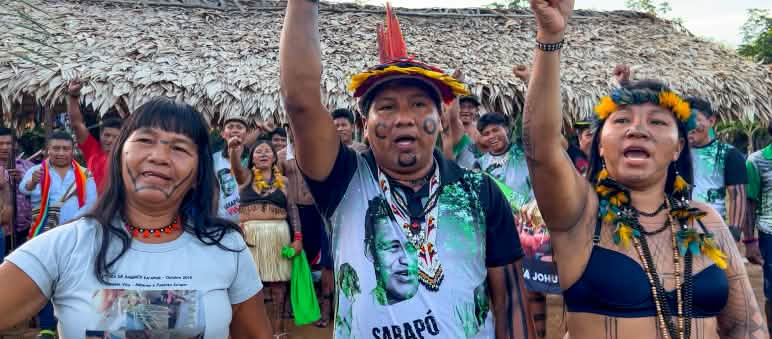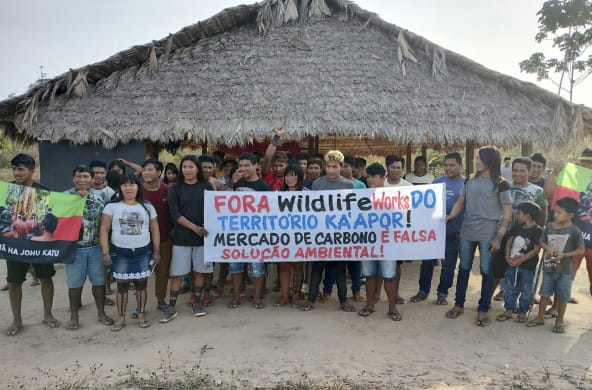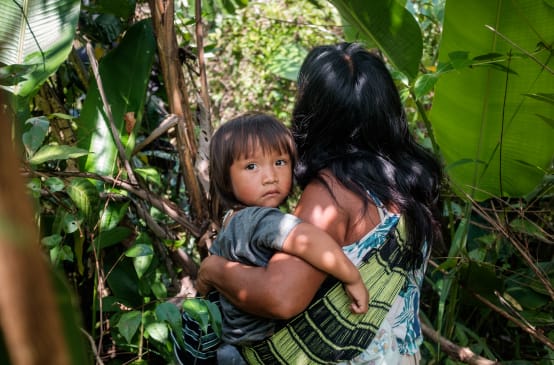
Court halts Wildlife Works' carbon trading project in the Amazon rainforest
Brazil: The US company Wildlife Works wants to operate a project for trading CO₂ certificates in the rainforest of the indigenous Ka'apor people. Now the judiciary has suspended the carbon project in our rainforest territory, the Indigenous Ka’apor Council Tuxa Ta Pame informs us.
On May 30, a Brazilian federal judge issued an injunction against Wildlife Works, a U.S. company, requiring it to immediately suspend all activities in the Alto Turiaçu rainforest, home to the Ka’apor people.
The judge’s decision follows a lawsuit filed by the Indigenous Ka’apor Council Tuxa Ta Pame, which opposes Wildlife Works’ proposed carbon project in the rainforest.
We have always protected and defended nature. That is why we are not selling nature to the carbon market. The forest is not a commodity. This must stop.”
– Itahu Ka’apor
Indigenous Ka’apor Council Tuxa Ta Pame
Tuxa Ta Pame has been one of our partner organizations in the Brazilian Amazon rainforest for over four years.
At their request, we launched the petition “Brazil: Keep U.S. carbon traders OUT of the Ka’apor rainforest” in May, which to date has been signed by more than 50,000 supporters. Through this petition, the Tuxa Ta Pame seeks international solidarity and aims to put pressure on the authorities.
The core issue is the right of all Ka'apor to consultation and to free, prior, and informed consent, as stipulated in Convention 169 of the United Nations International Labour Organization (ILO). This right applies to all projects and activities that affect Indigenous peoples’ land and lives.
According to the Tuxa Ta Pame, the U.S. company did not comply with these regulations. Additionally, Article 231 of the Brazilian Federal Constitution is said to have been violated.
The judge also cited these concerns in her reasoning. In her ruling, she noted that the national Indigenous agency FUNAI has confirmed that there are currently no specific regulations in Brazil for the commercialization of carbon credits on Indigenous land. FUNAI therefore advises against entering into such contracts until regulations are established.
Wildlife Works, however, claims to have been invited by another Indigenous organization, the Association Ka'apor Ta Hury Rio Gurupi, to implement the carbon project in the rainforest. The company says it is conducting the necessary consultations.
The Ka’apor have preserved their forest to this day
The roughly 3,000 Ka’apor people have preserved the rainforest through their traditional way of life and actively protect it from loggers, cattle ranchers, and mining companies. The rainforest in the 5,320-square-kilometer Alto Turiaçu territory is not only the community’s source of livelihood and a habitat of immense biodiversity, but it also stores millions of tons of carbon.
Wildlife Works aims to use this stored carbon to generate carbon credits that can be sold to companies and individuals for profit. This allows buyers to reduce their carbon footprint on paper or present themselves as climate neutral, even though they may continue to emit significant greenhouse gases in practice.
What happens next?
The project is suspended until the validity of the consultation process is determined in court. Resistance to the planned carbon project in the Ka’apor rainforest therefore continues. If you have not yet signed the petition, please consider doing so.
Further information:
REDD Monitor, June 9, 2025. Federal court in Brazil rules against Wildlife Works' REDD project on Indigenous Ka'apor territory
Justiça Federal da 1ª Região, 3ª Vara Federal Cível da SJMA, 2/6/2025. DECISÃO: https://www.regenwald.org/files/de/10880859220244013700_2189535512_Decis%C3%A3o.pdf
FUNAI, 1.4.2024. Posicionamento da Funai sobre créditos de carbono em terras indígenas: https://www.gov.br/funai/pt-br/assuntos/noticias/2024/posicionamento-da-funai-sobre-creditos-de-carbono-em-terras-indigenas
This is an area nearly four times the size of London and almost seven times the size of New York City.
This page is available in the following languages:

Brazil: Keep US carbon traders OUT of the Ka’apor rainforest!
The US company Wildlife Works is trying to push through a carbon credits project in the rainforest of the Indigenous Ka'apor people.

The Ka’apor people: defending the Amazon rainforest
Armed with bows, arrows, and determination, the Indigenous Ka’apor people are holding the line against mining, logging, and cattle barons.

Climate and the rainforest
Rainforests are tightly intertwined with the climate: while forests are suffering from global warming, they are also the key to climate protection.